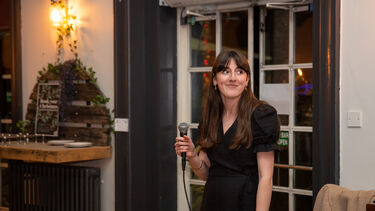You learn so many transferable skills as an English student and there’s often more links between your degree and the career you want than you realise

What is your current job and main responsibilities?
I’m the Digital Content Lead at digital sex education charity . We’re a tiny charity, made up of just three permanent staff members and supported by freelancers and volunteers. My primary responsibilities in my role are maintaining and developing our website content. I ensure our provision of digital sex and relationships content remains reliable, safe, accessible and engaging for young people. Being part of a small team often also means getting involved in other areas of the day-to-day running of the organisation, such as supporting with finances and operations. I love the variety, developmental opportunities and holistic view of the charity that its size allows, even if that does sometimes mean having to get to grips with things way outside my comfort zone!
How has your degree from the School of English, and your time at the University of ∫˘¬´”∞“µ, helped you in your career?
My degree massively informs my work on a daily basis. As a PhD researcher in linguistics I investigated the language of contraception in secondary school sex education and became critically aware of the power of language in shaping attitudes to sexual health. I am very fortunate to be able to apply the learnings from my PhD to my work at Fumble producing sex ed resources for young people. In so many sex education-related topics, such as gender and sexuality, language is not only vitally important, but also continuously evolving. My background in linguistics gives me the confidence to navigate these conversations around appropriate and accessible use of language. Being a student at the University of ∫˘¬´”∞“µ has also helped me in a very tangible way towards my current job as I initially started working with Fumble as a placement student through the Postgraduate Researcher Experience Programme (PREP), before working as a freelancer and then being offered a permanent role at the charity.
What does your typical week look like?
As a team, we try to schedule all our meetings for the mornings so that we can spend the afternoons working on our own specific projects. What I’m working on will be completely dependent on what project or campaign we have running at the time, and whether we have received funding for a specific piece of work. Working for a sex ed charity is perhaps a lot less ‘sexy’ than most people might assume! A typical week may mean travelling to facilitate an in-person event or meeting with a new collaborator, but a large part of my job also involves working on spreadsheets and developing project plans. Because we’re a small charity, I also have responsibilities that might be handled by a designated staff member or even a whole team in a bigger organisation. This means my job can vary from editing copy for a new page on our website to scheduling the month’s pay run. The variety is a challenge but I enjoy the way it constantly pushes me to learn new skills.
What is your greatest achievement to date?
In my current role, I’m most proud of setting up Fumble’s new rolling review process for our website content. This project involved creating a database of all our existing digital content and setting up a process for continually reviewing everything on our website to put us in line with the standards of other organisations in the sector. Now we are confident that our website content is of a consistently high standard, this means we are able to start working with young people to create more new content to continue to meet their needs. I’m also really excited about the next big project we have coming up where we’ll be writing two books about puberty for young people. Again, because we are such a small charity, I was able to take ownership for this project from negotiating the contract with the publisher, to planning and preparing the copy for the books.
What career advice would you give to a student interested in studying English?
The biggest piece of advice I can give is to keep your options open. There are so many different things you can do with an English degree - when I started my undergraduate degree I never thought I’d end up getting paid to edit guidance on how to put on a condom! Be interested and open to seeing where different routes can take you. Keep an open mind and don’t be afraid to change direction if you discover something you really enjoy that you’d never considered before. I would also say to think creatively about how your experience as an English graduate could fit with different job roles. You learn so many transferable skills as an English student and there’s often more links between your degree and the career you want than you realise.

